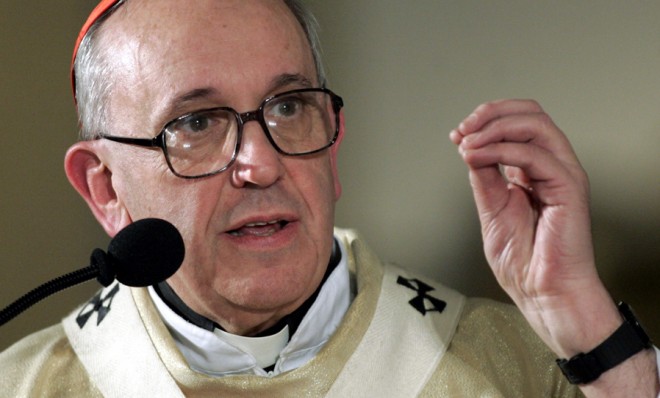Meet the new pope: Argentina's Jorge Mario Bergoglio
Bergoglio, who has taken the name Francis I, is the first Latin American to hold the post


A free daily email with the biggest news stories of the day – and the best features from TheWeek.com
You are now subscribed
Your newsletter sign-up was successful
A gathering of Catholic cardinals on Wednesday elected Jorge Mario Bergoglio to become the 266th pontiff of the Roman Catholic Church. Bergoglio, who has taken the name Pope Francis I, will succeed Pope Benedict XVI, who abruptly stepped down in February due to health concerns.
Francis is a 76-year-old Argentinean who was formerly the Archbishop of Buenos Aires. He is the first Latin American, as well as the first Jesuit, to become pope. Many had called on the church to elect a non-European, reflecting Catholicism's enduring strength in Latin America, the most populous Catholic region in the world, and Africa, where Catholicism is fast-growing.
Francis will face numerous challenges as the leader of the Catholic faithful. First among them is a child sex abuse scandal that has undermined the church's moral authority around the world, but particularly in Europe and North America, where the abuse was most rampant.
The Week
Escape your echo chamber. Get the facts behind the news, plus analysis from multiple perspectives.

Sign up for The Week's Free Newsletters
From our morning news briefing to a weekly Good News Newsletter, get the best of The Week delivered directly to your inbox.
From our morning news briefing to a weekly Good News Newsletter, get the best of The Week delivered directly to your inbox.
Francis was reportedly a runner-up in the last papal election in 2005, which resulted in Benedict becoming pope. According to John L. Allen Jr. at The National Catholic Reporter, Francis represented something of a compromise between the church's reformers and hard-liners. "He appealed to conservatives in the College of Cardinals as a man who had held the line against liberalizing currents among the Jesuits, and to moderates as a symbol of the church's commitment to the developing world," says Allen.
Francis' "reputation for personal simplicity also exercised an undeniable appeal," says Allen. "A Prince of the Church who chose to live in a simple apartment rather than the archbishop's palace, who gave up his chauffeured limousine in favor of taking the bus to work, and who cooked his own meals."
Francis' ascension, however, will not be without its controversies. Francis firmly opposes abortion, same-sex marriage, and contraception, the last being a particularly significant position as the Church continues to expand in Africa, where contraception is seen as a vital tool to limit the spread of sexually transmitted diseases. [UPDATE: The Guardian reports that Francis has "a slightly more pragmatic view on contraception, believing that it can be permissible to prevent the spread of disease."] He may also come under scrutiny for the Argentine Catholic Church's relationship to the military regime that seized power of the country in 1976. According to Hugh O'Shaughnessy at The Guardian:
Not only did the generals slaughter thousands unjustly, often dropping them out of aeroplanes over the River Plate and selling off their orphan children to the highest bidder, they also murdered at least two bishops and many priests. Yet even the execution of other men of the cloth did nothing to shake the support of senior clerics, including representatives of the Holy See, for the criminality of their leader General Jorge Rafael Videla and his minions. [The Guardian]
Indeed, prior to the 2005 election, Francis was accused of complicity in the 1976 abduction of two Jesuit priests. Francis has denied the charge, and according to an interview he gave to his biographer, he "took extraordinary, behind-the-scenes action to save them," says CBS News.
A free daily email with the biggest news stories of the day – and the best features from TheWeek.com
As a Jesuit, the choice of the name Francis, the first in a papal history full of Piuses and Benedicts, could not be more significant. Francis Xavier was the co-founder, along with Ignatius of Loyola, of the Jesuit order in the 16th century. Xavier is the church's most renowned missionary, spreading the word of God to India and as far east as Japan. According to Maurice Collis, in his book The Land of the Great Image, "The conversion of the whole Orient was Xavier's ambition," though he was so humble that when he arrived at the Portuguese colony of Goa in 1542, "it was noticed that he was barefoot, that his gown was ragged, and his hood of the coarsest stuff."
By choosing the name Francis, the new pope hopes to impart that mix of humility and ambition, according to church observers. "The new pope is sending a signal that this will not be business as usual," Allen told CNN.
Ryu Spaeth is deputy editor at TheWeek.com. Follow him on Twitter.
-
 What to know before filing your own taxes for the first time
What to know before filing your own taxes for the first timethe explainer Tackle this financial milestone with confidence
-
 The biggest box office flops of the 21st century
The biggest box office flops of the 21st centuryin depth Unnecessary remakes and turgid, expensive CGI-fests highlight this list of these most notorious box-office losers
-
 The 10 most infamous abductions in modern history
The 10 most infamous abductions in modern historyin depth The taking of Savannah Guthrie’s mother, Nancy, is the latest in a long string of high-profile kidnappings